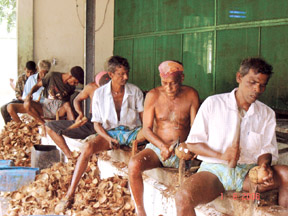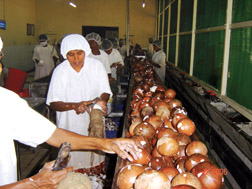|
observer |
|
|
|
|
|
OTHER LINKS |

|

|

|
Value added coconut products a top revenue earner
The coconut tree is known as the Kapruka or wish tree in Sinhala due to its many uses - be it cooking or making sweets, thatching roofs, manufacturing carbon or handicrafts. Coconut exports were the third highest revenue earner in the past. Although this position has now changed, value added coconut products still earns a substantial revenue for the country. The Renuka Group is one of the companies who contribute to bring in foreign exchange by exporting value added coconut products, be it coconut milk powder, liquid coconut milk, coconut based drinks or chutneys. The Renuka Group recently launched their coconut milk powder, liquid coconut milk and desiccated coconut in the local market. Head of Retail Renuka Group Hemal Dias said the rationale to launch in the local market was due to the high demand from local customers who had tasted their products internationally. Director, Marketing Shamindra Rajiyah said that Sri Lanka produces two billion coconuts annually and 70% is consumed locally. By using the traditional method of scraping and extracting coconut milk 40% is wasted and a developing country such as ours cannot afford to waste this amount of coconut. The Renuka coconut milk powder is free of artificial preservatives and colourings and is manufactured to international standards using the company's plantation fresh coconuts. The organic coconut plantation at Giriulla on 640 acres is intercropped with pepper, banana and pineapple. The plantation uses cow dung, goat manure and natural phosphate as manure while the creeper Gliricidia also gives the necessary manure by way of nitrogen. Rain water is harvested and kept in ponds to water the plantation during the dry season. Once the coconuts are harvested it is kept for 30 days before husking and a special process called hatcheting is used to separate the shell from the kernel. It is a labour intensive job and needs practice.
An experienced person can hatchet 2,500 coconuts per day.When the kernel is separated it is washed and cut using an incinarator at a modern state-of-the-art factory. It is then sent to the factory at Wathupitiwala for processing. "We process 20 tons per shift. We can get 72% coconut milk by processing the kernel. Once the milk is extracted it is canned using state of the art machines. The factory produces 30,000 cans per day. Once it is canned it is sterilised again and cooled before being packed and sent to its final destination. There are different machines and processes for different products such as liquid milk, desiccated coconut and coconut milk powder. The hygienic conditions are strict and anyone who enters the factory has to remove all jewellery, wear a coat, cap mask, and shoes given by the company and wash hands and dry them. The Renuka Group was the first coconut company in Sri Lanka to receive the ISO 22000 certification from RVA Netherlands. A unique feature of the Renuka Group is that over 50% of its exports are done under its own brands and it is one of Europe's preferred suppliers for hotels, airlines, confectionery and ready meal manufacturers. Rajiyah said that the foundation of the food business was agriculture. The company is firmly committed to sustainable agriculture to make Sri Lanka a preferred destination for processed agro based food and beverages while being the number one for coconut based food and beverages. |









